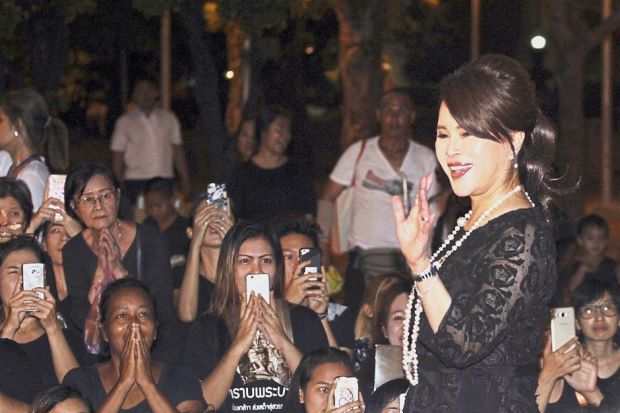MORE than ever since the latest military coup of 2014, Thailand seems likely to stagger towards a scheduled election.
Some shocks had been expected and the tense situation did not disappoint. More are being anticipated before election day on March 24.
The pro-Thaksin Thai Raksa Chart (TRC) party caused a storm of controversy by nominating Princess Ubolratana, King Vajiralongkorn’s elder sister, as its sole candidate for Prime Minister.
This was such a jolt to a constitutional monarchy forbidding the direct involvement of royal personages in politics as to draw a swift rebuke from Vajiralongkorn.
In mitigation, Ubolratana claimed to be just an “ordinary” candidate with no royal privileges. However, few were convinced.
She was fêted everywhere like the royalty everyone knew she was, and she acted the part. Her royal titles were removed when she married a foreigner in 1972, but were expected to be returned upon Vajiralongkorn’s coronation in May.
A formal complaint was filed with the Elections Commission (EC) against her candidacy. The EC rejected the candidacy soon after Vajiralongkorn opposed it, and the TRC swiftly withdrew it.
The EC has sought the party’s dissolution, which the Constitutional Court will consider this Wednesday. Some party leaders have already suspended their election campaign until a court decision.
Having Ubolratana as sole candidate for Prime Minister might have swung it in the TRC’s favour and Thaksin’s, owing to the princess’ popularity. But now that has become a party liability.
Thus Ubolratana’s political career ended before it had begun. That sums up the likely fortunes of virtually all the political players in this much-touted election.
Prime Minister Prayut Chan-ocha, coup leader and retired army chief, is popular but not his party – or rather he is far more popular than his party. Thailand allows for separate electoral considerations for candidate and party.
Yet technically Prayut has no party, heading a government with his appointed ministers all backed by the pro-junta Phalang Pracharat Party. He wants to remain Prime Minister after the election, but that depends much more on everyone else.
The army itself, so decisive in extra-parliamentary terms, is not above shooting itself in the foot. Its warning to parties against discussing cuts to the military budget backfired badly.
The TRC hopes to escape a ban, but when a court judgment is finally made it may have too little time to promote a new Prime Ministerial candidate. Meanwhile its nomination of Ubolratana still rankles with many.
The Democrat Party (DP) is the country’s oldest party but has never enjoyed a clear parliamentary majority. With its last heyday a generation ago, it has since failed to capitalise on its strengths in Bangkok and the southern provinces.
The rise of the new Future Forward Party (FFP) also signals the DP’s decline. The FFP’s natural base among the urban middle class should have been the Democrat’s, but a chunk of this demographic has moved to the FFP.
DP supporters hoping to check the FFP’s advance may be relieved by pending legal action against some party leaders for an “online speech” under the Computer Crimes Act.
The offending post outlined what the FFP believed were plans by junta leaders to maintain a mandate to govern after the election. Even that is now taboo.
As a fledgling Bangkok-based party still under a year old, the FFP lacks an effective nationwide support base or network. But it panders well to those who still imagine Bangkok politics equals national politics.
Despite considerable media hype, the FFP is unlikely to win anything substantial on its own. Nonetheless, the expected formal prosecution of party leaders will be seen as persecution and contribute to a growth in support.
The same applies to the TRC – if it is banned, support for other pro-Thaksin parties such as Pheu Thai may balloon.
Thaksin himself, in exile abroad, is seen as masterminding much of the action but still to little effect.
He remains politically ambitious but has changed in some ways.
Thaksin no longer seeks the premiership as long as he can manoeuvre behind the scenes. And he no longer thinks and acts in mere party terms, but in terms of a movement incorporating several parties.
Any ban on a pro-Thaksin party will result in the move by party leaders to another pro-Thaksin party. That has happened before and may happen again.
Whole parties have also moved between the pro- and anti-Thaksin camps. Where politics has become so polarised, this is nothing short of remarkable – but not in a good way.
A weakness of the Thai system is that no attractive ideology exists in any of the parties. A strength is that no real ideology exists at all.
Electoral politics today sees the simultaneous rise of official stakes, public expectations and popular demands. It may yet end unhappily in the Land of Smiles.
This article first appeared in The Star on 24 February 2019





